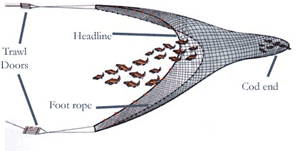Wednesday 25 January 2006
Parents of Toga (the stolen penguin) have produced an egg

The parents Kyala and Oscar of the baby jackass penguin Toga, which was stolen in December from the Amazon World Zoo Park on the Isle of Wight have gained worldwide attention by producing an egg that in approximately 40 days is expected to hatch.
Read more on the CNN website.
Or read the previous entries:
Zoo does not give up hope for stolen penguin Toga
In the news: Snatched penquin may be christmas gift
You can help spreading the word about this animal by liking it on facebook
Permanent Link
Saturday 07 January 2006
Secrets of the deap sea near extinction because of bottom trawling nets

Canadian researchers have studied five deep sea species in the North Atlantic Ocean. Recently, their study
revealed that some species suffered 98% decrease of population size in a generation, meeting the definition of 'critically endangered'. Among those are the roundnose grenadier, onion-eye grenadier, blue hake, spiny eel and spinytail skate.
Deep sea fish are extremely vulnerable, because of their late maturation. Any disturbance, and people largely blame the bottom trawling boats for this, can be the cause of dramatic effects. The bottom trawling nets scrape over the bottom of the ocean, plowing it to 15 cm deep. In this article on wikipedia it is explained how
bottom trawling works and a picture can be seen below. In their study, the scientists conclude that "
Conservation measures are necessary and lack of knowledge must not delay appropriate initiatives".

You can help spreading the word about this animal by liking it on facebook
Permanent Link
Thursday 05 January 2006
Tail hair of elephant reveals diet

A tail hair of an
elephant can reveal clues about their diet. Researchers look at the chemical analysis of an elephant hair to determine diet and behavior. In Kenya's Samburu National Reserve, scientists studied the elephants using GPS. Through the chemical analysis of the tail hairs, the researchers found out one of the seven elephants observed, had been raiding crop fields, which can upset farmers. "
How can we secure a future for elephants when we know that the areas set aside for their protection are too small?" said study co-author and zoologist Iain Douglas-Hamilton, founder of the Save the Elephants Foundation in Nairobi, Kenya according to
this article in BBC NEWS.
You can help spreading the word about this animal by liking it on facebook
Permanent Link
 The parents Kyala and Oscar of the baby jackass penguin Toga, which was stolen in December from the Amazon World Zoo Park on the Isle of Wight have gained worldwide attention by producing an egg that in approximately 40 days is expected to hatch.
The parents Kyala and Oscar of the baby jackass penguin Toga, which was stolen in December from the Amazon World Zoo Park on the Isle of Wight have gained worldwide attention by producing an egg that in approximately 40 days is expected to hatch.

 Canadian researchers have studied five deep sea species in the North Atlantic Ocean. Recently, their study
Canadian researchers have studied five deep sea species in the North Atlantic Ocean. Recently, their study 
 A tail hair of an
A tail hair of an